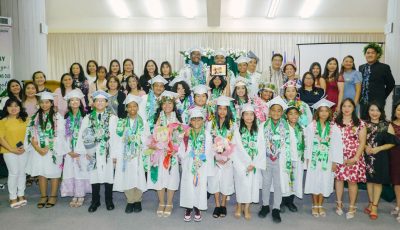Ethics and morality should be taught in public classrooms
What is the policy of our public school system regarding education and teaching of ethics and morality in the classroom?
A review of the mission statement and vision statement of PSS does not indicate or even mention a thing about ethics and morality as core subjects in its curricula. Surprising and unexplained but the Commissioner of Education’s Initiative section is empty.
Checking the CNMI Constitution for guidance on these subjects is even more problematic because it only reveals in one sentence that is couched in a very uncertain, loose, and ambiguous term and standard. Article 15 of the CNMI Constitution states in part, “The educational system shall also provide support and guidance for students in assessing areas of interest and ability, in clarifying values and goals, and in providing students with clear and accurate information so they may gain the most from their education experience.” As you can see, only a brief mention about what may be a core policy on ethics and morality education and teaching in our educational system that our Constitution mandates. Does this mean that our educational system is a value-less teaching and educational institution? Is this the core rationale why PSS does not account for ethics and morality teaching as an important, serious, and special aspect of human existence and necessary skills and indoctrination for all students entering and leaving the school system?
Somewhere along the line, values like morality, ethics, temperance, truth, lawfulness, etc., have come to be viewed as vestiges of the Judeo-Christian teachings or of religious origin and thus unacceptable in today’s educational environment. Is this that basic reason why PSS shy away from giving this issue high priority as important learning and education for our students because of potential legal hurdle this may involve?
Preparing children to take and own responsibility for their actions is a compelling community interest and should be accepted as good for society or civilization as a whole. Hence, what is wrong with teaching and education of children so that they know and choose between good or bad, truth or deceit, legal or illegal, honesty or lie, and desirable or undesirable social behavior of sort? As a community, are we intimidated by the vociferous emphasis on the separation of church and state? To avoid problems, even possible legal action, PSS only acknowledges priority attention to teaching academic subjects without touching on the values that are basic to civilization.
Here the problem is that those that appear protesting the lack of moral and ethics teaching in our public school system is viewed and ridiculed into insignificance or classed as out of step with present-day reality. Parents of my generation’s greatest aim in setting up schools was to give their children a better life than they had, better able to read and write and speak than they were and more prepared to change the world. Now, it seems we have given up on changing the world by making better people and gone to making people comfortable in the world they have because “that’s the way life is.” Is that what we want it to remain?
Today, education seems to be a popular subject in this year’s election as candidates list this as an important issue. “Am for education,” “education is important,” “without education our society suffers,” “each child deserves good and responsible education” are clichés that abound in pamphlets and talking points. I could not find one person in the slew of candidates that mentions a thing about values, ethics and morality teaching for our children. Are we all agreeing that teaching of values, ethics and morality in our public school system does not resonate well for our own wellbeing and happy future as a society?
What is wrong requiring a policy for our public school system that says: “It shall be the policy of the public school system to teach students the principles of morality, ethics truth, justice, temperance, humanity and patriotism; to teach them to avoid idleness, profanity and falsehood; to instruct them in the principles of free government and to train them in the true comprehension of the rights, duty and dignity of American citizenship.” This may be tall order for our teachers, but it is in no way an extreme mandate coming from extremist, fundamentalist, rationalist, conservatives, or over-jealous parents intent to limit and exclude the rights of others.
Teaching and education of moral values and ethics for all children in our public school system is an important social undertaking. Changing the mindset of the CNMI people should take front center attention within PSS itself and our elected representatives in both the legislative and executive branches of our government. It will require much deliberations before all are settled in unified level playing field, making the blueprint for our public education system. However, this also aims at curing ills of civil disorders and dysfunctions we face today in our communities. If we provide the blueprint of the basic public policy we approve and trust, moving forward would require PSS to follow and implement by spearheading and taking the lead on this. The desirable end results is toward meeting the public interest, but only if stakeholders and PSS are unified and play the same music on this issue.
Francisco R. Agulto
Kannat Tabla, Saipan



























